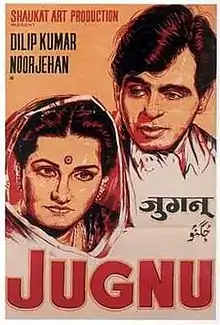Jugnu (1947 film)
Jugnu (lit. 'Firefly') is a 1947 Indian film directed by Shaukat Hussain Rizvi. The film stars Dilip Kumar, Noor Jehan, Ghulam Mohammad, Jillo, Latika, Shashikala and now famous playback singer Mohammed Rafi in a cameo appearance.[1][2]
| Jugnu | |
|---|---|
 Film poster | |
| Directed by | Shaukat Hussain Rizvi |
| Produced by | Shaukat Hussain Rizvi |
| Written by | A. S. Usmani |
| Screenplay by | Khadim Mohyuddin |
| Story by | A. S. Usmani |
| Starring | Dilip Kumar Noor Jehan |
| Music by | Feroz Nizami |
| Cinematography | P. Issac |
| Edited by | Mohsin T. Bangriwala |
Production company | Shaukat Art Productions |
| Distributed by | Shaukat Art Productions |
Release date | May 23, 1947 |
| Country | India |
| Language | Hindi |
| Box office | ₹50 lakh[lower-alpha 1] |
It was the highest-grossing Indian film of 1947.[lower-alpha 1][3] This film was the first major hit for Dilip Kumar, who went on to become one of the Indian film industry's legends.[4]
Both Shaukat Hussain Rizvi and his wife Noor Jehan settled in Pakistan shortly after the film was released.
Plot
Suraj is from a wealthy household. He meets Jugnu, when he tries to commit suicide by jumping off a cliff and Jugnu tries to stop him. In reality, it was a ploy conceived by Suraj and his friends to distract Jugnu and all the girls so that they can steal the food prepared by the girls. All of them study in the same college and live in a hostel. And thus, slowly, on meeting a few times, Jugnu and Suraj fall in love with each other. Jugnu was orphaned, when she was young and is taken care of by a friend of her father's, who wishes for her to be married to his own son. Suraj's parents come to know about his love for Jugnu and oppose the match as Jugnu is poor. One day, in a conversation with his father, Suraj comes to know that they are not rich as all the assets (bungalow, things etc.) owned by his father are mortgaged under a heavy loan and so he plans to arrange the marriage of Suraj to a rich household so that the dowry received will help them pay off the loan and continue living a wealthy life. Suraj is surprised to hear this, but he nevertheless is happy as now he can marry Jugnu as both are poor. But Suraj's mother goes to Jugnu and pleads for her son's life explaining her predicament and Jugnu promises her that she will get out of Suraj's life. What happens next is the central plot of the story. Will Suraj and Jugnu meet again? Will the difference be sorted out between them? Will the lovers' love be sacrificed for parents' happiness and money?
Cast
Soundtrack
Feroz Nizami provided superb music for this film, film song lyrics were written by the top lyricists of the time including Adeeb Saharanpuri (M. G. Adeeb) and Asghar Sarhadi. Most of the film songs ended-up being popular.[5]
| No. | Title | Singer(s) | Length |
|---|---|---|---|
| 1. | "Yahaan Badala Wafa Ka Bewafai Ke Siwa Kya Hai[1]" | Noor Jehan, Mohammed Rafi[1] | 04:47 |
| 2. | "Woh Apani Yaad Dilaane Ko" | Mohammed Rafi | 03:14 |
| 3. | "Aaj Ki Raat Saaz-E-Dil-E-Purdard Na Chheirr" | Noor Jehan | 04:43 |
| 4. | "Hamein To Sham-E-Gham Mein Katni Hai Zindagi Apni[1]" | Noor Jehan | 04:04 |
| 5. | "Umangein Dil Ki Machleen Muskarai Zindagi Apni[1]" | Noor Jehan | 03:49 |
| 6. | "Desh Ki Purkaif Rangi Si Fizaon Mein Kahi[1]" | Roshan Ara Begum[1] | 04:48 |
| 7. | "Tum Bhi Bhula Do Mein Bhi Bhula Dun[1]" | Noor Jehan | 03:47 |
| 8. | "Laut Jawaani Phir Nahin Aani[1]" | Shamshad Begum | 05:55 |
| Total length: | 35:07 | ||
Box office
Jugnu (1947 film) grossed ₹50 lakh (US$5 million) in India, making it the highest-grossing Indian film of 1947. When adjusted for inflation, its gross in 2016 value is equivalent to ₹363 crore (US$57 million).[lower-alpha 1] in 1947 (equivalent to US$57 million or ₹363 crore[6] in 2016)</ref> This is the highest for any Indian film at the time, until it was surpassed by Andaz, which also stars Kumar in lead role along with Nargis and Raj Kapoor.
Notes
- ₹50 lakh[3] (US$5 million)[lower-alpha 2]
- 1 Indian rupee per US dollar in 1947<ref name='toirupee'>"Journey of Indian rupee since independence". The Times of India (newspaper). 16 August 2013. Archived from the original on 16 August 2013. Retrieved 9 July 2020.
References
- Soundtracks and cast of Jugnu (1947 film) on Cineplot.com website Published 12 March 2016, Retrieved 9 July 2020
- Firoze Rangoonwalla, Indian Filmography, publisher: J. Udeshi, Bombay, August 1970, pp. 224.
- "Top Earner Films of 1947". BoxOfficeIndia.com website. 6 February 2009. Archived from the original on 16 October 2013. Retrieved 9 July 2020.
- Ashish Rajadhyaksha and Paul Willemen, Encyclopaedia of Indian Cinema, British Film Institute, Oxford University Press, New Delhi, 2002, pp. 132.
- Film Jugnu (1947 film) on Complete Index To World Film (CITWF) website Retrieved 9 July 2020
- 67.175856 INR per USD in 2016